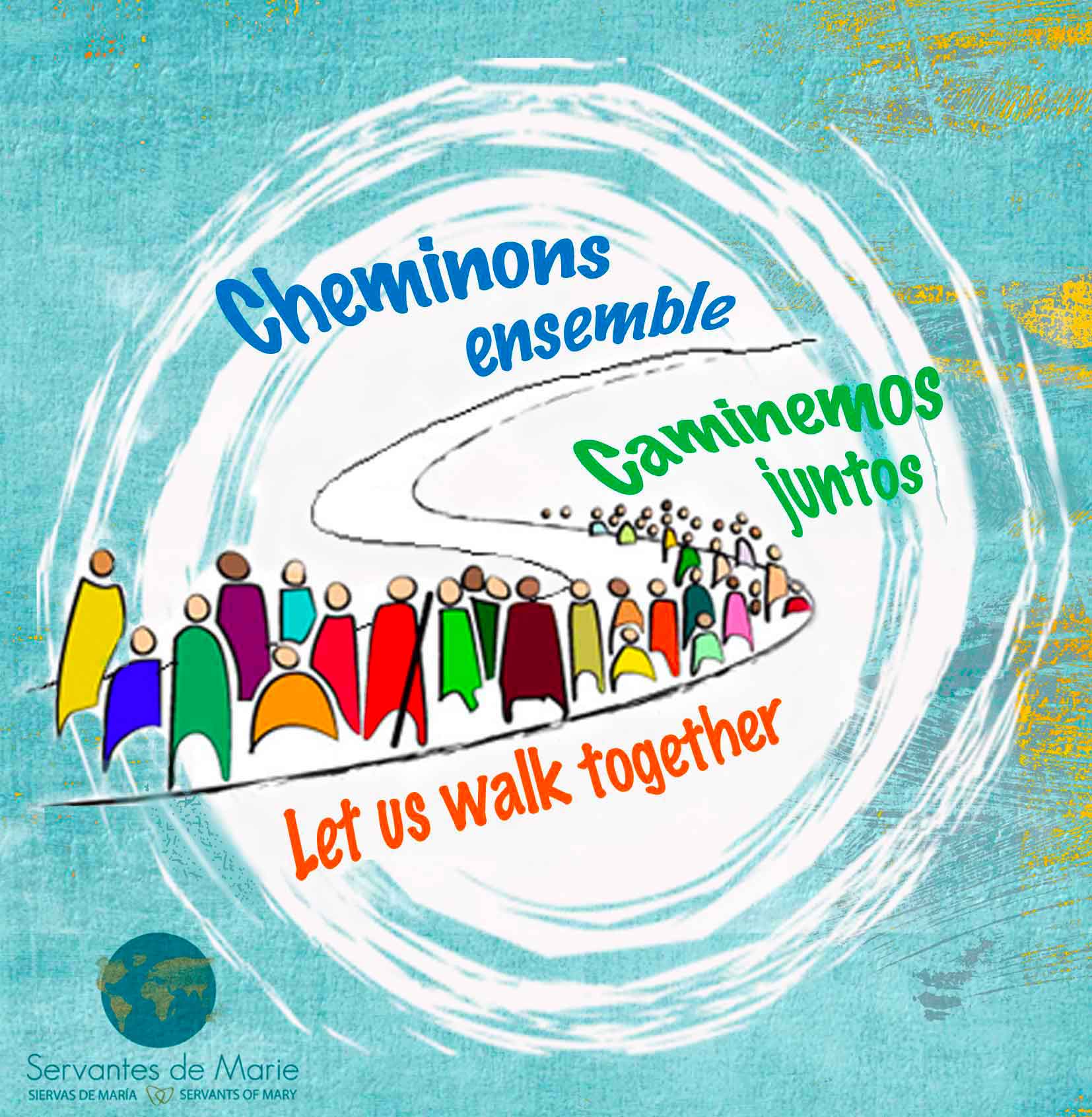
"LET US BE HOPE" - SEPTEMBER 2023
Let's walk together - Letter September 2023

Dear readers,
We meet again to reflect on this year's theme: "Let us be Hope".
In this second letter, we invite you to look at it from the point of view of the founder of the Servants of Mary and Pope Francis.
How can we "be hope" in our current, concrete reality? Let's recall some of Good Father Cestac's actions and thoughts that answer this question..
 Faces of desperation
Faces of desperation
In 1831, in the port city of Bayonne (France), we stop in front of a group of little girls abandoned in the street and another group of young prostitutes. All damaged in their dignity, abandoned by the world and by the most intimate of all, their own families. Wounded and shattered in the trust of their loved ones, "rejected" as Pope Francis would say, desperately alone as are the victims of human trafficking and all those who suffer exploitation and abuse, with few other options than to search day by day, in emergency, for the means to survive.
Result of a past that did not help to have a worthy present. Poverty of the most extreme kind, because it combines the material, the spiritual and the social. And what does the future hold? Complete uncertainty, no alternative for building a life project, living from day to day.
How dark are the lives of these hopeless girls and young people!
The source of hope, prayer
 In this context, a young priest and assistant priest at Bayonne cathedral, Father Cestac, was moved by the situation of little street girls and young prostitutes. What he saw in the streets of this city affected him and mobilized him within. A man of prayer, attentive to the signs of God, he understood that he had to find an urgent solution. But how to respond to such poverty? With what means? With whom?
In this context, a young priest and assistant priest at Bayonne cathedral, Father Cestac, was moved by the situation of little street girls and young prostitutes. What he saw in the streets of this city affected him and mobilized him within. A man of prayer, attentive to the signs of God, he understood that he had to find an urgent solution. But how to respond to such poverty? With what means? With whom?
Louis-Édouard Cestac reminds us that the answers lie in prayer... "I must above all be a man of prayer". He urges us to pray before taking any action or making any decision.
"Our hope is prayer, prayer made with confidence." Prayer shapes you, your thoughts and your actions.
Louis-Édouard experienced the love and concrete intercession of the Virgin Mary as a child, due to serious health problems. Since then, he has entrusted himself to her maternal love. On July 19 1838, in the sanctuary of Buglose, he asked Our Lady for the money needed to receive these young women. She replied, "Ask only for my Spirit". Henceforth, whatever he did for these girls and young women, it would be Mary who inspired him. Father Cestac will be the instrument that materializes the love of God expressed in Mary.
Their closeness and his commitment are the concrete face of hope.
 Waiting and trust make their place, provide shelter
Waiting and trust make their place, provide shelter
At first, Father Cestac and his sister Élise received and accompanied the abandoned girls in a humble place lent by a former mayor of Bayonne, but it soon became too small. He was approached by young prostitutes, whom he also tried to help. His opponents questioned his budding work, without collaborating.
In the face of all difficulties, Louis-Édouard Cestac remained inspired by Mary and profoundly confident in her providence. Finally, he managed to settle in a property called "Châteauneuf" in Anglet, which was to become Notre Dame du Refuge.
Little by little, hope was reborn in the lives of these little girls and young women... they underwent a profound experience of restoration and rebirth. Father Cestac and a group of educators, including his own sister, Élise, built a place where love of the family reigned. Working in the soil, developing crops, producing plantations full of hope and ensuring subsistence. "In working together, they discovered their sisters." (L.E. Cestac).
Now their life projects are strengthened, they can nourish their hopes, they can think about the future. Their new found dignity will soon enable them to dream of serving others.
On January 6, 1842, a group of 14 women inspired by Cestac's work decided to dedicate their lives to Mary, giving birth to the Congregation of the Servants of Mary. Later, in 1851, a group of young women decided to devote their lives to silence, prayer and work. Thus, was born the contemplative community of Bernardines: "God alone".
The Virgin Mary's work continued to spread, crossing the boundaries of Anglet, France and Europe, finding different faces of despair everywhere. A number of works were created in response, and are still very much alive today.
Don't let them steal your hope
 To complete our reflection, let's recall some words of Pope Francis on hope:
To complete our reflection, let's recall some words of Pope Francis on hope:
"Never let yourself be overcome by discouragement. Our joy is not something that comes from possessing many things, but from having found a person, Jesus, who is among us, a hope born of knowing that with him, we are never alone, even in difficult times, even when life's path encounters problems and obstacles that seem impossible to overcome, and there are so many of them! (...)
Let's follow Jesus. We accompany, we follow Jesus, but above all we know that he accompanies us and carries us on his shoulders: this is our joy, the hope that we must carry into this world of ours. And please, don't let yourselves be robbed of hope, the hope that Jesus gives us." (Homily for Palm Sunday, XXVIII World Youth Day, March 24, 2013)
Hope is a hidden virtue, enduring and patient
 "It is the humblest of the three theological virtues, because it remains hidden", explains Pope Francis: "Hope is a risky virtue, a virtue, as St. Paul says, of ardent waiting towards the revelation of the Son of God (Rom. 8:19). It is not an illusion." (Homily at Santa Marta, October 29, 2013).
"It is the humblest of the three theological virtues, because it remains hidden", explains Pope Francis: "Hope is a risky virtue, a virtue, as St. Paul says, of ardent waiting towards the revelation of the Son of God (Rom. 8:19). It is not an illusion." (Homily at Santa Marta, October 29, 2013).- "It is a virtue that never disappoints: if you wait, you will never be disappointed. (...) Hope is concrete, it's daily because it's an encounter. And each time we encounter Jesus in the Eucharist, in prayer, in the Gospel, in the poor, in community life, each time we take another step towards that definitive encounter." (Santa Marta Homily, October 23, 2018).
- "Hope needs patience, just as it takes patience to see the mustard seed grow. It is the patience of knowing that we sow, but it is God who makes it grow." (Santa Marta Homily, October 29, 2019).
- "Hope is not a passive optimism but, on the contrary, it is fighting, with the tenacity of those who go towards a sure destination." (Angelus, September 6, 2015).
We conclude

Some questions for reflection
Prayer to nourish our hope

Father Cestac and hope

- January 6, 1842, at the first profession of the Servants of Mary, "We didn't have a bit of wood to keep Mgr. the Bishop warm.";
- 1846, the beginning of Saint-Bernard, "I could not, for lack of means, do anything worthwhile there...".